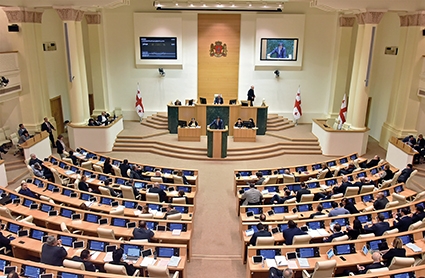Parliament Approves Draft Law on Selection of Judges
The Parliament of Georgia on Wednesday approved with the first reading the draft law on Common Courts, with 89 MPs for and 31 against.
The Draft was initiated by the Speaker of Parliament Irakli Kobakhidze and ruling Georgian Dream (GD) MPs: Archil Talakvadze, Mamuka Mdinaradze, Anri Okhanashvili, Giorgi Kakhiani, Davit Matikashvili and Guram Macharshvili.
The amendments set procedures and criteria for the selection of the candidates for the posts of Supreme Court Judge, the qualification requirements of judges and the procedure for nominating candidates, selected by the High Council of Justice, to Parliament.
A second project was also submitted to Parliament, prepared by MP Eka Beselia, who quit the ruling Georgian Dream party after a disagreement regarding the selection criteria of judges. Beselia demanded the suspension of lifetime tenure for judges but her initiative was not supported by a sufficient number of MPs.
Co-authors of Beselia’s project are MPs Levan Gogichaishvili, Zviad Kvachantiradze, Gedevan Popkhadze, Beka Natsvlishvili, Irma Inashvili, Giorgi Lomia, Gela Mikadze, Emzar Kvitsiani, Ada Marshania, Nato Chkheidze, Gia Zhorzholiani and Mirian Tsiklauri.
The issue became controversial after the High Council of Justice (HCOJ) nominated 10 candidate judges for the Supreme Court of Georgia for life tenure. The list was rejected by the non-judge members of the HCOJ, NGOs and some members of the majority, who claimed that the presented judges had been working during the previous government and had the reputation of being “biased and corrupt.”
Parliament Speaker Irakli Kobakhidze then said the discussions on the issue had been postponed until spring, adding a working group would be set up from the representatives of various sectors, which would define some additional criteria regarding the selection process of the judges.
The working group was set but it was later left by the NGOs, which stressed the format did not serve as a means for discussing genuine legislative changes to ensure a merit-based approach to the selection process and its transparent and impartial conduct.
“The unequivocal position of the Speaker during the working meeting made it clear that he does not intend to come up with a draft that would preclude the unilateral nomination of Supreme Court judge candidates by the dominant clan of the judiciary,” the third sector claimed.
Before voting for the draft on March 20, Kobakhidze addressed the MPs and called on them to vote for his bill.
Speaking on behalf of the Majority, the Speaker touched upon the working process and the principles serving the basis for development of the bill. He underlined that the bill authored by the ruling party is the only draft not in confrontation with the Constitution.
The Speaker added that various parties concerned were engaged in development of the bill and the ruling party had done its best to share every recommendation within the Constitutional frame.
“We shall keep our achievement and will never allow for political revenge against the judicial system by a political force previously successfully controlling the judicial authority… An independent judiciary serves only one goal: protection of human rights, and this statistic data is not just a mere figure but implies thousands of people whose rights are duly protected today by the independent Court,” he said.
The Speaker’s bill was criticized by the opposition parties, who claim that the draft leaves power to the “clan” within the judiciary system.
Roman Gotsiridze, from the United National Movement, stated that the draft is an attempt to restructure the justice system the way in a way that serves the interests of the informal ruler of the country, referring to the founder and the Chair of GD, Bidzina Ivanishvili.
In addition, European Georgia member Otar Kakhidze said that the parliamentary majority is well aware that “the justice system is in the hands of the clan, but they want to support them.”
Public Defender Nino Lomjaria says the draft law prepared by the Chairman of the Parliament on the selection of the Supreme Court judges cannot respond to the existing challenges.
She explained that criteria and procedures should not only be formal but should be able to substantially change the practice of decision-making under the High Council of Justice and ensure fairness.
The Ombudsman considers that the following changes should be made to the draft law submitted by the Parliament Speaker: criteria, secret ballot, for Parliament to ensure the obligation of an open ballot at the legislative level, in addition, the conflict of interests and the issues related to the number of voters and candidates.
“In response to these challenges, it is very important to adopt relevant legislation to improve the process, to increase trust in the decisions of the Council of Justice… We have an extraordinary situation and, accordingly, we have to find a way out quickly," said Lomjaria, adding that they should inform the Venice Commission and the OSCE about the recent developments.
By Thea Morrison
Image source: parliament.ge












